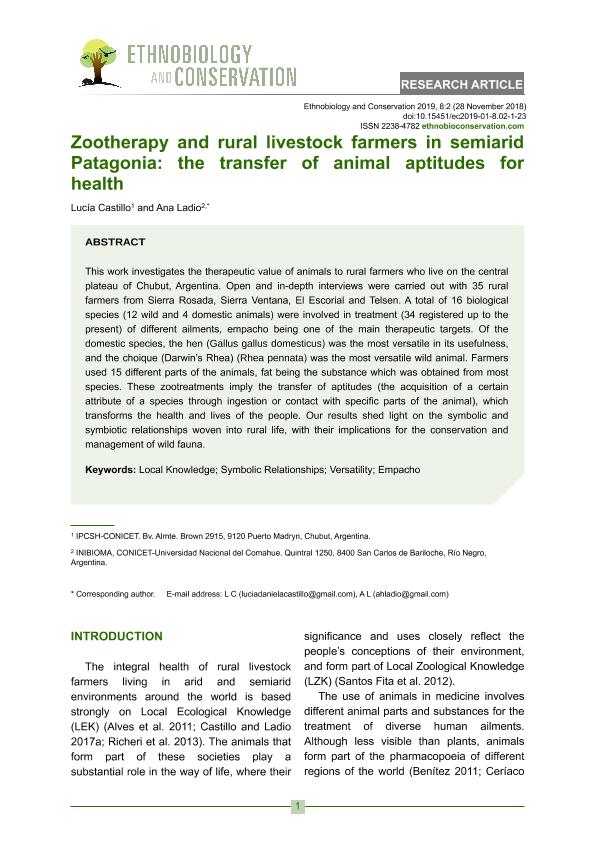Artículo
Zootherapy and rural livestock farmers in semiarid Patagonia: The transfer of animal aptitudes for health
Fecha de publicación:
11/2018
Editorial:
Universidade Federal Rural de Pernambuco
Revista:
Ethnobiology and Conservation
ISSN:
2238-4782
Idioma:
Inglés
Tipo de recurso:
Artículo publicado
Clasificación temática:
Resumen
This work investigates the therapeutic value of animals to rural farmers who live on the central plateau of Chubut, Argentina. Open and indepth interviews were carried out with 35 rural farmers from Sierra Rosada, Sierra Ventana, El Escorial and Telsen. A total of 16 biological species (12 wild and 4 domestic animals) were involved in treatment (34 registered up to the present) of different ailments, empacho being one of the main therapeutic targets. Of the domestic species, the hen (Gallus gallus domesticus) was the most versatile in its usefulness, and the choique (Darwin's Rhea) (Rhea pennata) was the most versatile wild animal. Farmers used 15 different parts of the animals, fat being the substance which was obtained from most species. These zootreatments imply the transfer of aptitudes (the acquisition of a certain attribute of a species through ingestion or contact with specific parts of the animal), which transforms the health and lives of the people. Our results shed light on the symbolic and symbiotic relationships woven into rural life, with their implications for the conservation and management of wild fauna.
Palabras clave:
EMPACHO
,
LOCAL KNOWLEDGE
,
SYMBOLIC RELATIONSHIPS
,
VERSATILITY
Archivos asociados
Licencia
Identificadores
Colecciones
Articulos(INIBIOMA)
Articulos de INST. DE INVEST.EN BIODIVERSIDAD Y MEDIOAMBIENTE
Articulos de INST. DE INVEST.EN BIODIVERSIDAD Y MEDIOAMBIENTE
Articulos(IPCSH)
Articulos de INSTITUTO PATAGONICO DE CIENCIAS SOCIALES Y HUMANAS
Articulos de INSTITUTO PATAGONICO DE CIENCIAS SOCIALES Y HUMANAS
Citación
Castillo, Lucía Daniela; Ladio, Ana Haydee; Zootherapy and rural livestock farmers in semiarid Patagonia: The transfer of animal aptitudes for health; Universidade Federal Rural de Pernambuco; Ethnobiology and Conservation; 8; 2; 11-2018; 1-23
Compartir
Altmétricas




